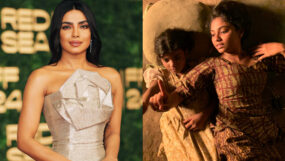
Actor and BJP MP Kirron Kher, known for her exquisite taste in saris, says our country needs to revive the handloom industry.
Kirron was here to inaugurate on Thursdaythe exhibition “Sarees of India 2015 – Innovating Tradition”, organised by non-profit organisation Delhi Crafts Council of India.
“Ladies are doing such great work. They are working with yarn and weaves. The collection is innovative yet classic. One can see revival. If we continue like this, I think our handloom industry will completely revive which we need to because there is no where in the world to get this,” Kirron told IANS.
The three-day exhibition at Aga Khan Hall on Bhagwan Dass Road boasts of handcrafted saris from across the country.
Held annually, the exhibition focuses on highlighting innovative new techniques and designs that infuse new life into traditional weaves and prints.
“We have this exhibition every year before the onset of winters and the festive season as at this time of the year people buy saris. We choose the participants very carefully,” said Purnima Rai, president, Delhi Crafts Council of India.
“Craft has to move forward and new designs have to come in. We choose people who are sympathetic to the weavers and have helped communities to come up. For instance, people from Bengal like Bapa, who has single handedly almost transformed the Purulia village…Little bit of intervention, input and marketing sparks off the whole thing…” she added.
An annual award called the “Sutrakar Samman” was presented to Kabiraj Nayak, a Bomkai weaver from Odisha. Nayak is one of the four remaining Bomkai weavers in his village and the only weaver among them who still retains the knowledge and skill of weaving a pure silk Bomkai.
Over the last couple of years, he has been able to revive all the original motifs that a Bomkai sari was once renowned for, like bitter gourd, peacock, parrot, trees, flowers, fishes, pomegranate seeds and lamp stand.
The sari collection exhibits creations from different states such as saris from Udaipur that have been created entirely in natural indigo. A display of subtle and intricate Ikat saris in Eri silk can be seen along with vegetable dyed Ajrakh saris.
The six-yard wonder in interesting textures and new techniques, bright and bold hues have been displayed that flaunts the creations of weavers of West Bengal and contemporary Gadhwal saris are a treat for the sore eyes.
Besides traditional Bandhani saris, Assamese ones with the old traditional motifs of the Mishing tribe in natural dyes and Tussars from Bihar. Venkatagiri silk saris of Andhra Pradesh, Benarasi cotton Jamdanis, and Khadi saris from Maharashtra are also part of the exhibition.
Inputs by IANS

























Leave a Reply